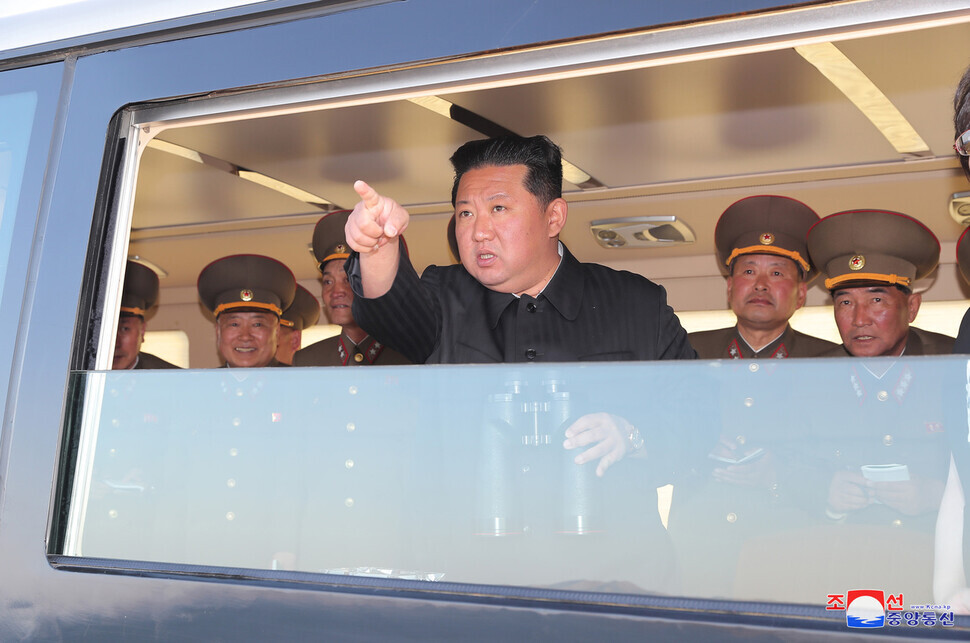hankyoreh
Links to other country sites 다른 나라 사이트 링크
[Guest essay] Hopes for detente on the Korean Peninsula under Yoon Suk-yeol


The new presidential administration that takes office in May will have to contend with a situation on the Korean Peninsula where geopolitical clashes have sparked a mounting crisis. On top of the intensifying strategic competition between the US and China, war has also erupted in Ukraine.
As China and Russia band together, we are seeing a repeat of the Cold War-era framework of antagonism in Northeast Asia, which is expected to make inter-Korean relations more difficult.
At the same time, this situation could also represent a process of building up the kind of energy that may bring about a great geopolitical shift. We need a contrarian strategy — one that involves moving ahead into a new era and leaving behind the Cold War blocs of South Korea, the US, and Japan on one side versus North Korea, China, and Russia on the other.
For the sake of unifying public opinion in South Korea, it is more beneficial when a conservative administration is able to improve inter-Korean relations and pursue detente on the peninsula.
Historically, it was the conservative administration of then-US President Richard Nixon that took the first step in joining hands with China. In South Korea’s case, it was the Roh Tae-woo administration that successfully implemented its “Nordpolitik” by establishing diplomatic ties with China and Russia.
Given the geopolitical changes that have taken place, maintaining the existing system of Cold War-era antagonism no longer aligns with the interests of the South Korea-US alliance.
If sanctions and pressure against the North have achieved no practical effect, what about a strategy where the South Korea-US alliance embraces North Korea? In terms of a grand shift in Northeast Asia geopolitics, these are the directions in which the climate is taking shape.
First, there is an awareness of the need for a change in US geopolitical strategy.
The old guard of geopolitical scholars and realist strategists has been calling for us to separate China and Russia for the sake of victory in the strategic rivalry between the US and China. But now US-Russia relations have been souring due to the war in Ukraine, and as China and Russia grow closer, North Korea has also been establishing a tighter bond.
It’s a state of affairs where the problems that the US has to contend with — including the fate of Taiwan — are growing larger in scope. Meanwhile, as Washington has begun overtly antagonizing Beijing, there is no longer any need for the demonization of North Korea that was used in the past as a rationale for building up the US military presence in Northeast Asia.
Just as the US established detente with China and started focusing on its rivalry with the Soviet Union in the 1970s, we should now be considering a “divide and rule” strategy in which we separate North Korea from China and Russia and bring it over into the South Korea-US camp.
Second, there is a realization that the existing strategies for achieving the denuclearization of North Korea have basically failed.
The North’s nuclear capabilities have only grown in their level and quantity, but we still lack ideas for how to control that. A direct strike is not an option in a situation where we cannot fully destroy the North’s offensive capabilities. The damage that would result — not only to North Korea, but also to the South and the US — beggars the imagination.
But the US cannot revert to its previous approaches of “strategic disregard” or “strategic patience.” Attempts to adopt a UN Security Council statement denouncing North Korea’s intercontinental ballistic missile test on March 24 ended up foundering due to objections from China and Russia. The strategy of achieving denuclearization by pressuring the North with economic sanctions has already lost its impact, since it requires the cooperation of Beijing and Moscow.
Third, the North Korean nuclear program can end up being a double-edged sword. Trusting in the US, Russia, and Europe, Ukraine denuclearized — and then ended up being invaded. What is North Korea thinking as it watches those events unfold?
It’s time for us to move past the notion of denuclearization as a precondition for dialogue, which there is almost zero chance of the North accepting. If, on the other hand, a nuclear-armed North Korea were to be brought into the South Korea-US fold, it would become a double-edged sword.
Russia has been using military force to stop a denuclearized Ukraine from joining up with Europe, but neither China nor Russia is likely to use military force if a nuclear North Korea were to join up with South Korea and the US. In other words, the North’s nuclear capabilities work in its favor, allowing it to make its own decisions independently from Beijing or Moscow.
In the early stages of denuclearization, Seoul and Washington must make it a priority to deploy inclusive North Korea policies and transform Pyongyang’s dependence on Beijing.
The reason North Korea has depended on China and Russia for the past seven decades is that it has had no other option.
Pyongyang is well aware that Beijing is seeking to maximize its influence by simply “managing” things to prevent the North from collapsing, without providing the kind of full-scale economic support that might introduce some momentum for growth. If North Korea were to attract the kind of overseas capital investment that turns it into a “second Vietnam,” that would turn the Northeast Asian geopolitical situation in a very different direction.
We need to give some objective thought to what sort of strategy is actually beneficial to the South Korea-US alliance. This is where we can start the process of dismantling the Cold War-era oppositions in Northeast Asian geopolitics: on the Korean Peninsula, with North Korea.
Please direct questions or comments to [english@hani.co.kr]

Editorial・opinion
![[Column] Samsung’s ‘lost decade’ and Lee Jae-yong’s mismatched chopsticks [Column] Samsung’s ‘lost decade’ and Lee Jae-yong’s mismatched chopsticks](https://flexible.img.hani.co.kr/flexible/normal/500/300/imgdb/original/2024/0512/3017154788490114.jpg) [Column] Samsung’s ‘lost decade’ and Lee Jae-yong’s mismatched chopsticks
[Column] Samsung’s ‘lost decade’ and Lee Jae-yong’s mismatched chopsticks![[Correspondent’s column] The real reason the US is worried about Chinese ‘overcapacity’ [Correspondent’s column] The real reason the US is worried about Chinese ‘overcapacity’](https://flexible.img.hani.co.kr/flexible/normal/500/300/imgdb/original/2024/0510/5217153290112576.jpg) [Correspondent’s column] The real reason the US is worried about Chinese ‘overcapacity’
[Correspondent’s column] The real reason the US is worried about Chinese ‘overcapacity’- [Editorial] Yoon’s gesture at communication only highlights his reluctance to change
- [Editorial] Perilous stakes of Trump’s rhetoric around US troop pullout from Korea
- [Guest essay] Preventing Korean Peninsula from becoming front line of new cold war
- [Column] The state is back — but is it in business?
- [Column] Life on our Trisolaris
- [Editorial] Penalties for airing allegations against Korea’s first lady endanger free press
- [Editorial] Yoon must halt procurement of SM-3 interceptor missiles
- [Guest essay] Maybe Korea’s rapid population decline is an opportunity, not a crisis
Most viewed articles
- 1[Column] Samsung’s ‘lost decade’ and Lee Jae-yong’s mismatched chopsticks
- 2Seoul’s plan to adopt SM-3 missiles is like wanting a sledgehammer to catch a fly
- 3[Correspondent’s column] The real reason the US is worried about Chinese ‘overcapacity’
- 4‘We must say no’: Seoul defense chief on Korean, USFK involvement in hypothetical Taiwan crisis
- 5[Guest essay] Maybe Korea’s rapid population decline is an opportunity, not a crisis
- 660% of young Koreans see no need to have kids after marriage
- 7Yoon rejects calls for special counsel probes into Marine’s death, first lady in long-awaited presse
- 8[Book review] Who said Asians can’t make some good trouble?
- 9S.K.-Japan joint history project to be revived
- 10Former President Roh Tae-woo, mastermind of 1979 military coup, dies at 88